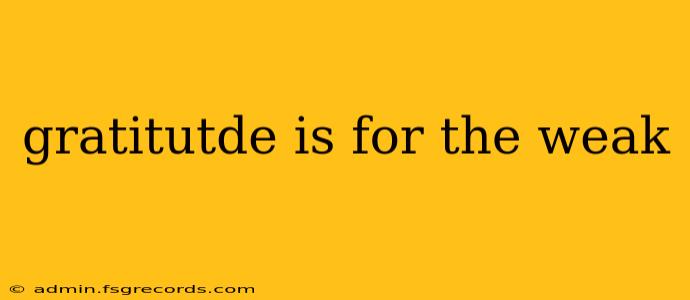Gratitude is for the Weak? Reframing a Toxic Mindset
The statement "gratitude is for the weak" is a dangerous oversimplification, a toxic mindset cloaked in a veneer of self-reliance. While appearing strong on the surface, this belief actually hinders personal growth, resilience, and overall well-being. Let's unpack why this perspective is flawed and explore the true power of gratitude, even – and especially – for those striving for strength and success.
The Misconception of Weakness
The idea that gratitude equates to weakness often stems from a misunderstanding of its nature. It's not about passive acceptance of hardship or a denial of challenges. Instead, gratitude is an active practice of acknowledging and appreciating the positive aspects of one's life, even amidst adversity. It's about recognizing the good, no matter how small, and understanding that even difficult experiences can contribute to growth and learning.
To conflate gratitude with weakness is to misunderstand resilience. Truly strong individuals are not those who ignore or suppress their emotions, but those who can process them healthily and constructively. Gratitude is a powerful tool in this process. It helps to shift perspective, fostering a more positive outlook and enhancing the capacity to cope with stress and hardship.
The Strength in Gratitude: A Deeper Dive
The benefits of practicing gratitude are well-documented. Numerous studies show its positive impact on:
- Mental Health: Gratitude reduces symptoms of anxiety and depression, fostering a more optimistic mindset.
- Physical Health: It's linked to improved sleep, reduced blood pressure, and a strengthened immune system.
- Resilience: By focusing on the positive, gratitude helps build inner strength and the ability to bounce back from setbacks.
- Relationships: Expressing gratitude strengthens bonds and improves communication.
- Productivity and Performance: A grateful attitude fosters a sense of purpose and motivation, improving focus and efficiency.
Reframing the Narrative: Strength Through Appreciation
Instead of viewing gratitude as a sign of weakness, consider it a cornerstone of emotional intelligence and a catalyst for personal growth. It's a proactive choice, not a passive resignation. It's about consciously choosing to focus on the positive aspects of life, even when faced with difficulties.
Strong individuals are not those who avoid vulnerability or hardship, but those who navigate these challenges with grace, resilience, and a deep appreciation for the support and opportunities they have.
Cultivating a Gratitude Practice
Integrating gratitude into your daily life can be simple. Try these techniques:
- Keep a gratitude journal: Write down three things you're grateful for each day.
- Express appreciation to others: Let people know you value them and their contributions.
- Practice mindfulness: Pay attention to the small, positive moments in your day.
- Use affirmations: Repeat positive statements about what you appreciate in your life.
In conclusion, the notion that gratitude is for the weak is a harmful misconception. True strength lies in acknowledging both the challenges and the blessings in life, and using gratitude as a tool to build resilience, foster positive emotions, and cultivate a fulfilling life. It's time to reframe this narrative and embrace the empowering potential of gratitude.

